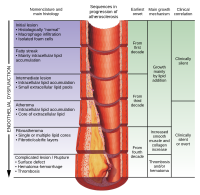
Photo from wikipedia
Objective— Endoglin, a transforming growth factor-&bgr; superfamily coreceptor, is predominantly expressed in endothelial cells and has essential roles in vascular development. However, whether endoglin is also expressed in vascular smooth… Click to show full abstract
Objective— Endoglin, a transforming growth factor-&bgr; superfamily coreceptor, is predominantly expressed in endothelial cells and has essential roles in vascular development. However, whether endoglin is also expressed in vascular smooth muscle cells (VSMCs), especially in vivo, remains controversial. Furthermore, the roles of endoglin in VSMC biology remain largely unknown. Our objective was to examine the expression and determine the function of endoglin in VSMCs during angiogenesis. Approach and Results— Here, we determine that endoglin is robustly expressed in VSMCs. Using CRISPR/CAS9 knockout and short hairpin RNA knockdown in the VSMC/endothelial coculture model system, we determine that endoglin in VSMCs, but not in endothelial cells, promotes VSMCs recruitment by the endothelial cells both in vitro and in vivo. Using an unbiased bioinformatics analysis of RNA sequencing data and further study, we determine that, mechanistically, endoglin mediates VSMC recruitment by promoting VSMC migration and spreading on endothelial cells via increasing integrin/FAK pathway signaling, whereas endoglin has minimal effects on VSMC adhesion to endothelial cells. In addition, we further determine that loss of endoglin in VSMCs inhibits VSMC recruitment in vivo. Conclusions— These studies demonstrate that endoglin has an important role in VSMC recruitment and blood vessel maturation during angiogenesis and also provide novel insights into how discordant endoglin function in endothelial and VSMCs may regulate vascular maturation and angiogenesis.
Journal Title: Arteriosclerosis, Thrombosis, and Vascular Biology
Year Published: 2017
Link to full text (if available)
Share on Social Media: Sign Up to like & get
recommendations!